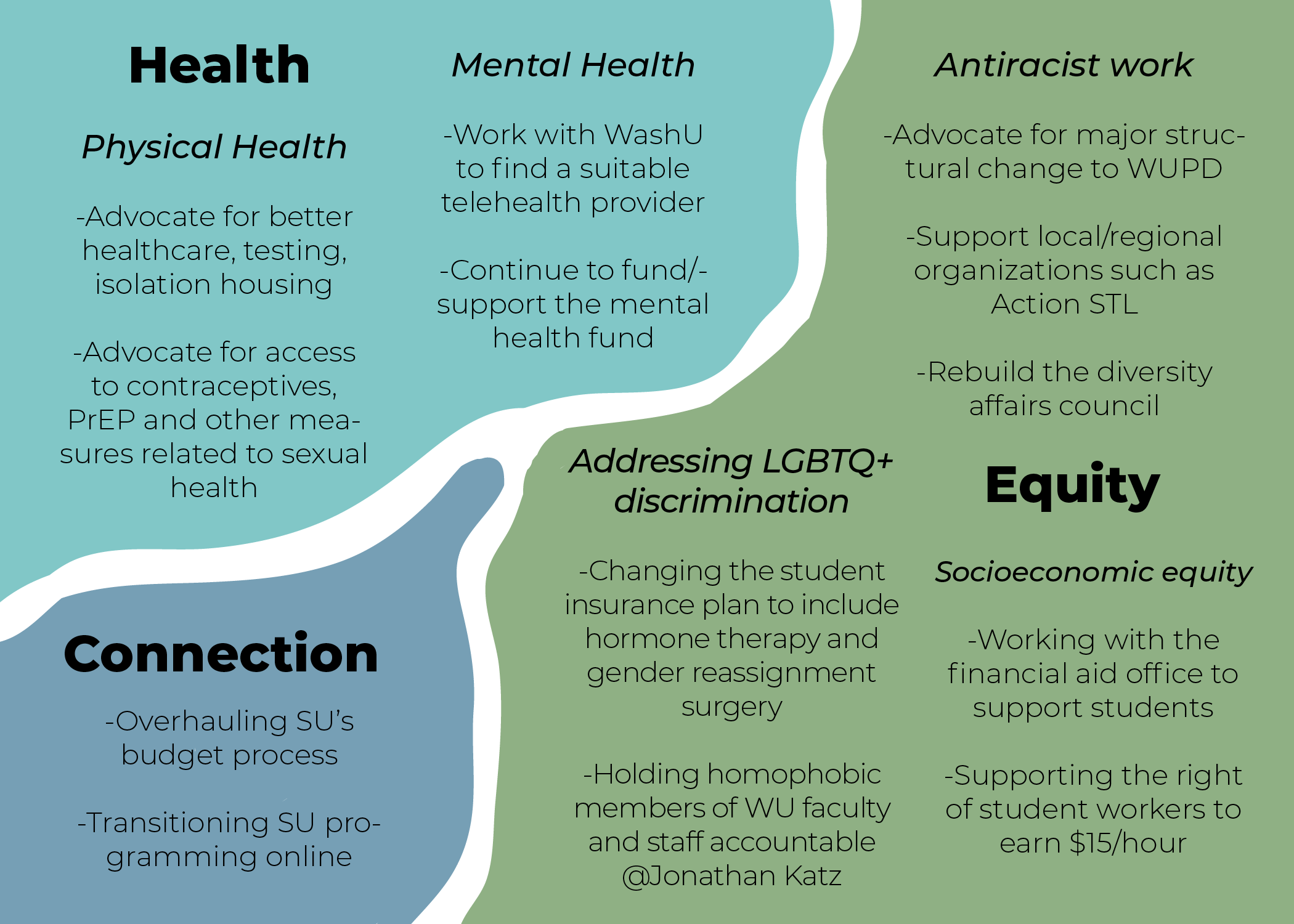News | Student Union
Student Union announces new 2020-2021 platform focused on health, equity and connection
Student Body President sophomore Ranen Miao welcomed students back to campus in a Sept. 8 email detailing Student Union’s 2020-21 term goals for the upcoming academic year. The plan centered around three goals: health, equity and connection, tenets that acknowledge the unusual and persistent challenges of the year.
“This year, we will be advocating for policies that will keep students safe, working with administrators to implement protections for students at-risk and creating a blueprint for a healthier Wash. U. community in the years to come,” the plan read.
SU is coming off of a productive summer with hopes to continue that momentum into the fall semester. The SU-organized Month of Action, which centered around partnering with other student groups to engage in anti-racist work, raised $85,000 and continued efforts to push the administration toward more investment in the community.
 Christine Watridge | Student Life
Christine Watridge | Student Life Included in the health portion of the platform are methods to expand medical access and coverage for students as well as mental health resources to ensure every student can maintain mental as well as physical health during this unique semester.
“[Health] means access to healthcare and access to mental health coverage…We’re in conversations about how we can expand our coverage to virtual mental health care and telehealth, we’re talking about how we can work [with] Habif to market all the resources they currently have and we’re trying to make sure that students know that they have access to the Mental Health Fund,” Miao said.
Executive Vice President of Student Union Anne He said that she strongly believed the mental health aspect of SU’s platform would be especially crucial this year.
“One [goal] that I want to really help emphasize is the mental health aspect, especially for students who are virtual this semester,” He said. “I know our Senate within SU is doing a bunch of really awesome stuff. For example, this past summer they were able to work on a database for therapists and providers that were recommended by universities in each area of the country and create sort of a national therapist database.”
In many ways, the health and equity tenets overlap when realizing the impact students and faculty can have off campus. Miao noted the importance of physical distancing and following all university public health guidelines not only for the health of the University community but for the health of the greater St. Louis community.
“We also need to talk about [COVID-19] through an anti-racist lens, because having a lot of wealthy white students from Wash. U. who go into the [Delmar] Loop, who don’t wear masks, who don’t physical distance and who spread COVID-19 will disproportionately harm the people of color in the nearby community,” Miao said.
Some of the new equity initiatives include advocating for structural changes to the Washington University Police Department, creating more gender-neutral bathrooms on campus, supporting campus groups that are fostering leadership for female students, incorporating more diverse voices and backgrounds into discussions within SU and working towards solutions to food and housing insecurity for low-income students.
He particularly focused on how SU could help the University live up to its commitment of meaningfully engaging with the St Louis community.
“We have all the time heard [that] Wash. U. has this commitment to St. Louis and we are Wash. U. in St. Louis and for St. Louis, but a lot of the time, as an average student who isn’t necessarily involved in a community service group, we don’t actually get a lot of direct interactions with the St. Louis community at all,” He said.
In light of this disconnect, He said that SU hopes to find a way for students to connect with the St. Louis community even if they weren’t part of a traditional community service club. In addition to improving SU’s local impact, Miao also hopes to focus on advocacy on a national level.
“Nationally, connection means reaching outwards,” Miao said. “So during the summer I have spoken with the student body presidents of over 70 institutions and we’ve been able to begin building a framework for a national organization of student governments that tries to advocate on national issues…so that we connect student voices with national decision-making in business, in higher education and in government.”
The new reality of virtual meetings and interactions as well as sudden shifts in advocacy are not concerns to Miao as SU navigates the remote semester. “I think this student government is so strong and we have some people who are so passionate about student government, so I really believe that we can have a really successful year and a really successful term.”
For students who are interested in getting involved with Student Union, Miao invited all students to feel comfortable with reaching out to him personally.
“I genuinely think that the most important part of student government is being someone who can be here to listen, because at its core, we are students who care about the other students on our campus,” he said.
Both Miao and He expressed gratitude for their involvement with SU.
“Wash. U. is a space where you will definitely find a home and a community of people who you will be able to grow with, live life with and really become a whole new person by the end of the experience,” Miao said. “And I hope that kids aren’t disillusioned by the fact that things are so chaotic right now and so many things seem inaccessible to us.”
